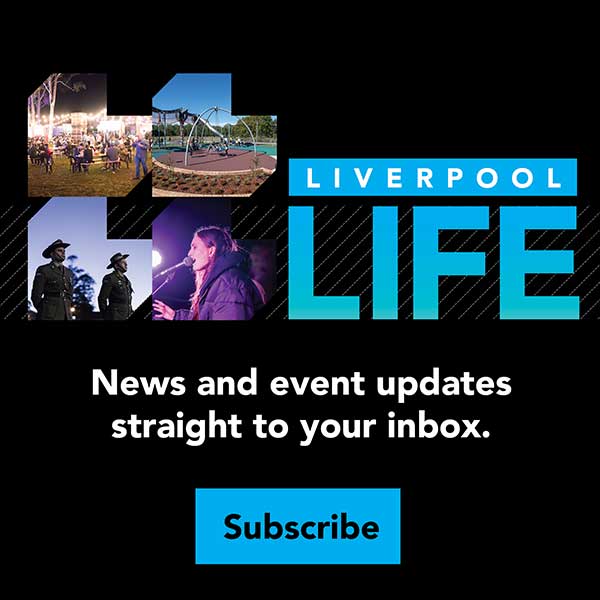Warning: Aboriginal and Torres Strait Islander people are advised that this page may contain images of deceased Aboriginal or Torres Strait Islander people.
Liverpool City Council acknowledges the original inhabitants of the Liverpool area, being the Darug and Tharawal Aboriginal people.
Council provides a number of initiatives to promote and celebrate Aboriginal culture within Liverpool.
If you wish to be part of the Aboriginal Consultative Committee or want to find out more about various Aboriginal events or Local Aboriginal History, please contact the Community Development Worker.
Welcome to Country is an important traditional Aboriginal cultural practice. It is conducted prior to official meetings, events or activities, where an Aboriginal person welcomes the community to their country. Each community (Aboriginal Tribal Area) has their own way of performing this practice. A welcome to country is a way of reminding visitors to the area that Indigenous people are part of Australia.
Welcome to Country can only be conducted by an approved Aboriginal representative of the area in which the event is being held. For example if there was an event being held in the Gandangara boundaries, a representative must be sourced from that tribe or from the traditional custodians (Darug Nation or Tharawal Nation).
The First Nations Cultural Protocols seek to recognise Australia’s Indigenous people by observance of practices and acknowledgements contained in the document.
The Aboriginal Consultative Committee was established by resolution of Council on 22 September 1997. The committee facilitates positive relations between Council at all levels and the local Aboriginal community. The Aboriginal Committee provides guidance to Council on Aboriginal issues and local Aboriginal Heritage matters.
The committee is open to all members of the Aboriginal community, non-Aboriginal people and Council Officers.
Meetings are held quarterly. Guest speakers are also welcome to attend.
To date the Committee has supported the development and implementation of the Liverpool Aboriginal Cultural Protocols and a Reconciliation Action Plan.
If you are interested in being part of this committee, contact Council’s Community Development Worker.
Consulting with the Aboriginal Community
Consultation with Aboriginal people is an important component of working with the local community. Observing appropriate protocols when working with Aboriginal people and communities is critical to establishing positive and respectful relationships.
Gandangara Local Aboriginal Land Council: 02 9602 5280
Deerubin Local Aboriginal Land Council: 02 4724 5600
Tharawal Local Aboriginal Land Council: 02 4681 0059
Liverpool City Council’s Reconciliation Action Plan was established by resolution of Council on 22 September, 1997. Find out more here.
Aboriginal people have lived in NSW for more than 40,000 years. There's evidence of this everywhere, in rock art, stone artefacts and sites across the state.
The NSW Government passed the Aboriginal Land Rights Act 1983 (NSW) which is considered "the most generous legislation" allowing Aboriginal people to claim Crown land that is not needed for any essential purpose. It also set up a network of local land councils and a state land council (considered Australia's richest).
Liverpool City Council is privileged to have three local Aboriginal Land Councils operating within its LGA: Gandangara Local Aboriginal Land Council, Deerubin Local Aboriginal Land Council and Tharawal Local Aboriginal Land Council.
The Collingwood Precinct
The Collingwood Precinct at Liverpool was officially named an Aboriginal Place and acknowledges the traditional owners of the land. The announcement was made by Dr Andrew McDonald MP, the then Member for Macquarie Fields, at a special ceremony. This precinct was a significant meeting place for the Tharawal and Dharug people and, with the Georges River nearby, a source of valuable natural resources.
Council is committed to the ongoing preservation of the site through its Plan of Management for Collingwood Precinct 2007-2017, which provides a framework for the sustainable management and maintenance of this land.
Holsworthy
The Holsworthy area falls within the Tharawal Local Aboriginal Land Council area. The Dharawal homeland is bounded by Botany Bay to the north and the Georges River to the west and extends to the South Coast. The Liverpool area was also the home of the Cabrogal clan of the Dharug people.
Artwork, archaeological sites, scarred trees and artifacts dot the Holsworthy area. More than 500 significant Aboriginal sites have been found within the restricted access areas of the Australian Army firing range at Holsworthy. Drawings of wombats, macropods, fish, eels, turtles, bats, emus, birds, lizards and other animals abound. More will be found as field surveys continue.
The main difference between the Holsworthy art samples and others is that red and white pigment appears to have been used equally for hand stencils while in other samples red clearly dominated. Charcoal, however, was the most commonly used pigment for artwork. The area also features a number of engraving sites. All of these are well preserved and appear to be telling a story. A total of 69 grinding groove sites (for making axes etc) have been recorded in the Holsworthy training area.
Scarred Trees
Thousands of surviving trees in NSW bear scars resulting from removal of bark or wood by Aboriginal people in the past for the manufacture of canoes, shields and other artefacts. There are a number of "scarred trees" that have been recorded in Liverpool. One is on display at the Liverpool Regional Museum, kindly on loan from the Gandangara Local Aboriginal Land Council.
If you would like to learn more about Liverpool's rich local Aboriginal culture and its hidden gems, contact Council's Community Development Worker.
- 13 February: The Apology; The anniversary of former Prime Minister Kevin Rudd's apology to Australia's Indigenous Peoples;
- 21 March: Harmony Day. International Day for the Elimination of Racial Discrimination;
- 22 March: National Close the Gap Day. A campaign for Indigenous health equality;
- 26 May: Sorry Day. Commemorating the Stolen Generation;
- 27 May to 3 June: Reconciliation Week. Celebrating two significant events: the 1967 Referendum on 27 May 1967 and the Mabo decision on 3 June 1992;
- July: NAIDOC Week. A celebration of Aboriginal and Torres Strait Islander people, culture, history, and achievements;
- 4 August: National Aboriginal and Islander Children's Day;
- 3 September: Indigenous Literacy Day. Raising national literacy levels.
Click here for information on the Aboriginal and Torres Strait Islander flags.
NAIDOC Week celebrations are held across Australia each July to celebrate the history, culture and achievements of Aboriginal and Torres Strait Islander peoples.
Liverpool’s NAIDOC celebrations are proudly presented by Liverpool City Council and form part of National NAIDOC Week events held throughout Australia.
Aboriginal organisations
Australian Institute for Aboriginal and Torres Strait Islander Studies
Torres Strait Regional Authority
Arts & Culture
Australia Council: Aboriginal and Torres Strait Islander Arts
Education
Australian Indigenous Mentoring Experience
Government
Australian Federal, State and Territory Governments Entry Point
Australian Government Indigenous Portal
Australian Local Government Association
National Native Title Tribunal
Office of the Registrar of the ALRA
Health
Australian Indigenous Health Info Net
Commonwealth Department of Health and Aged Care
Heritage
Indigenous Land Corporation (ILC)
National Library of Australia Community Heritage Grants
National Native Title Tribunal (NNTT)
Heritage NSW: The Aboriginal Heritage Information Management System
History
Australian Museum: Aboriginal Sydney Resources
University of Sydney: A History of Aboriginal Sydney
Housing
Land Councils
Central Land Council (Central Australia)
Goldfields Land and Sea Council (WA)
Indigenous Land and Sea Corporation (Commonwealth)
Law & Justice
Australian Human Rights Commission
Australians for Native Title and Reconciliation
Jumbunna Indigenous House of Learning
Media
Australian Broadcasting Corporation - Indigenous


